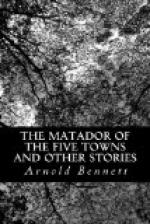There were a hundred and forty-two residences in Birches Street, Hanbridge, all alike, differing only in the degree of cleanliness of their window-curtains. Two front doors together, and then two bow-windows, and then two front doors again, and so on all up the street and all down the street. Life was monotonous, but on the whole respectable. Annie came of an economical family, and, previous to the wedding, she had been afraid that William Henry’s ideal of economy might fall short of her own. In this she was mistaken. In fact, she was startlingly mistaken. It was some slight shock to her to be informed by William Henry that owing to slackness of work the honeymoon ought to be reduced to two days. Still, she agreed to the proposal with joy. (For her life was going to be one long honeymoon.) When they returned from the brief honeymoon, William Henry took eight shillings from her, out of the money he had given her, and hurried off to pay it into the Going Away Club, and there was scarcity for a few days. This happened in March. She had then only a vague idea of what the Going Away Club was. But from William Henry’s air, and his fear lest he might be late, she gathered that the Going Away Club must be a very important institution. Brachett, for a living, painted blue Japanese roses on vases at Gimson & Nephews’ works. He was nearly thirty years of age, and he had never done anything else but paint blue Japanese roses on vases. When the demand for blue Japanese roses on vases was keen, he could earn what is called “good money”—that is to say, quite fifty shillings a week. But the demand for blue Japanese roses on vases was subject to the caprices of markets—especially Colonial markets—and then William Henry had undesired days of leisure, and brought home less than fifty shillings, sometimes considerably less. Still, the household over which Annie presided was a superiorly respectable household and William Henry’s income was, week in, week out, one of the princeliest in the street; and certainly Annie’s window-curtains, and her gilt-edged Bible and artificial flowers displayed on a small table between the window-curtains was not to be surpassed. Further, William was “steady,” and not quite raving mad about football matches; nor did he bet on horses, dogs or pigeons.
Nevertheless Annie—although, mind you, extraordinarily happy—found that her new existence, besides being monotonous, was somewhat hard, narrow and lacking in spectacular delights. Whenever there was any suggestion of spending more money than usual, William Henry’s fierce chin would stick out in a formidable way, and his voice would become harsh, and in the result more money than usual was not spent. His notion of an excursion, of a wild and costly escapade, was a walk in Hanbridge Municipal Park and two shandy-gaffs at the Corporation Refreshment House therein. Now, although the Hanbridge Park is a wonderful triumph of grass-seed and terra-cotta over cinder-heaps and shard-rucks, although it is a famous exemplar to other boroughs, it is not precisely the Vale of Llangollen, nor the Lake District. It is the least bit in the world tedious, and by the sarcastic has been likened to a cemetery. And it seemed to symbolize Annie’s life for her, in its cramped and pruned and smoky regularity. She began to look upon the Five Towns as a sort of prison from which she could never, never escape.




